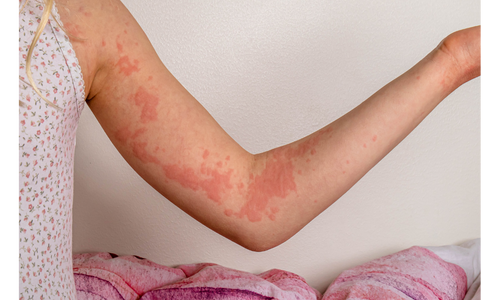
Hives is a common disease characterized by attacks of skin redness, swelling and itching that may appear and disappear in a short time.
Hurticaria is more than normal. covered with skin It can appear as pink, edematous blisters or coalescing plaques.
It has a random distribution, including the face and scalp.
It can be seen on the lips, hands. and edema of the feet is common.
Lesions do not occur at all. One does not last longer than 24 hours. However, new lesions may appear.
Itching is severe, swelling in the hands and feet may cause pain.
It usually occurs suddenly.
Are there types of urticaria?
Acute urticaria reaches its peak within 1-3 days and passes within 7-21 days
Chronic urticaria (lasting longer than 6 weeks) progresses with flare-ups and remissions over months or even years.
What are the causes?
In acute urticaria, the underlying cause can be determined in 20-30% of the cases
Most common causes:
Drugs (painkillers, muscle relaxants, antibiotics), food (seafood, chocolate, tomatoes, eggs, cookies, strawberries, alcohol), intravenous radiopaque substances, insect stings, infections (flu). , cold, urinary tract infection), emotional tension.
In chronic urticaria (lasting longer than 6 weeks) in less than 5% of cases cause can be detected.
Drugs, tooth decay, gallbladder, kidney stones, sinusitis, H.pylori in the stomach, etc.
Are there other types of urticaria?
1.Cholinergic urticaria
-Most common in young people. It is seen in adults
-It is in the form of smaller blisters that disappear quickly on the upper part of the body
-Heat, exercise and emotional changes may trigger it.
2.Physical urticaria is less common
-Cold
-Pressure
-Sunburn
3.Dermographism: blistering of the skin as a result of slight rubbing or trauma.
What is the treatment?
< p>The trigger must be identified and removed. If there is an infection, it should be found and treated. Even if this is not always possible, you can take medication unless necessary during a 2-3 week period. Its consumption should be avoided. The diet recommended for you should be followed. One should be alert against angioedema that may develop as a result of tongue and lip swelling.It is recommended to avoid intense exercise and emotional stress during this period.
Cool baths and compresses are temporary. provides relaxation. The antihistamine medication given to you must be used regularly in the recommended doses.
In resistant and special cases, various oral medications can be given.


